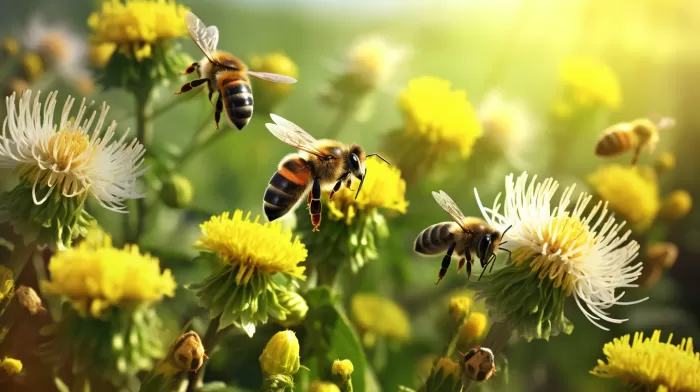Farmers have long been fans of GMO crops because these genetically modified plants can withstand the herbicides doused on farm fields. But the unintended casualties of this process are the pollinating insects, like bees and butterflies, that actually play a critical role in maintaining the health of humans, the food supply, and our ecosystems. The loss of plant diversity in farm fields can pose a real threat to these helpful insects and the food webs they support.
Precariously connected: plants, insects, and human health
Researchers at the University of Bristol, funded by the Biotechnology and Biological Sciences Research Council (BBSRC) in England, discovered that the plants farmers destroy with herbicides – including thistles, buttercups, and clover – are essential for maintaining the fragile food webs on farms. The health of pollinating insects is closely linked to the plant diversity in farm fields. Consequently, the decimation of these insects could undermine the entire food chain.
Researcher Jane Memmott stresses the importance of understanding the connections between species, as these links have a significant impact on a community’s response to species loss, species restoration efforts, and the provision of ecosystem services such as pollination and pest control. To manage farmland diversity effectively, ecologists, land managers, and policy makers need to be aware of these connections.
Fellow researcher Michael Pocock adds that focusing on the sustainability of one group of animals may not necessarily benefit others; however, he also suggests that restoring specific plants, such as buttercups, thistles, and clover, could potentially and rapidly increase biodiversity across the farm.
Loss of pollinators: the wider consequences
It’s not just the collapse of food chains that we need to worry about when it comes to the loss of pollinators. The decline of bee populations, for example, can have other negative consequences, such as:
- food scarcity: Bees play a central role in pollinating the plants that produce a large portion of our food. If their numbers continue to dwindle, crop yields could decline, leading to a shortage of food supplies. According to the USDA, bees pollinate 80% of flowering plants and are responsible for one in every three bites of food we eat. Without bees, our diets would be severely restricted to simple grains and cereals.
- economic impact: Farmers rely on bees to pollinate their crops. Without them, the agricultural industry would face massive losses, as the majority of fruits, nuts, and vegetables wouldn’t grow. In the United States alone, bees contribute more than $15 billion annually to the food production process (White House Archives).
- environmental imbalance: Bees play a significant role in supporting the growth of trees, flowers, and other plants, which provide food and habitats for a variety of other species. The loss of bees would result in an imbalance in our ecosystem, with detrimental effects on countless plants and animals.
Solutions to support pollinator populations
To counter the potential devastation brought about by the loss of pollinators, several measures can be taken:
- reducing pesticide use: Farmers can adopt integrated pest management systems that utilize natural predators and reduce the use of harmful pesticides. By doing so, they preserve the homes and food sources of pollinators, as well as mitigating the threat of pesticide exposure.
- planting diverse crops: By planting a variety of plants, rather than relying heavily on monoculture, farmers encourage beneficial pollinators to visit and establish populations in their fields. Some farmers are even planting wildflowers and native plants near their crops, creating additional habitats that help attract and support pollinator populations.
- public awareness and education campaigns: Informing consumers about the importance of pollinators and the dangers GMOs pose to their survival can lead to demand for products made without genetically modified organisms (GMOs). This, in turn, could encourage more farmers to reduce their use of GMO crops and associated herbicides.
The bottom line is that farmers and consumers alike need to recognize the vital role pollinators play in our ecosystem, food supply, and overall health. By taking steps to nurture these critical insects, we don’t just help them – we help ourselves and the planet we share.



